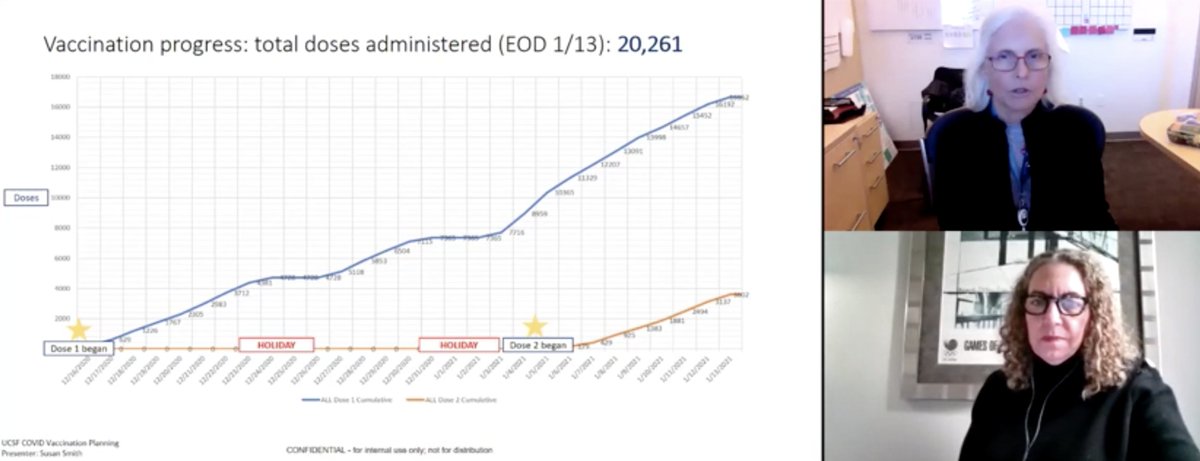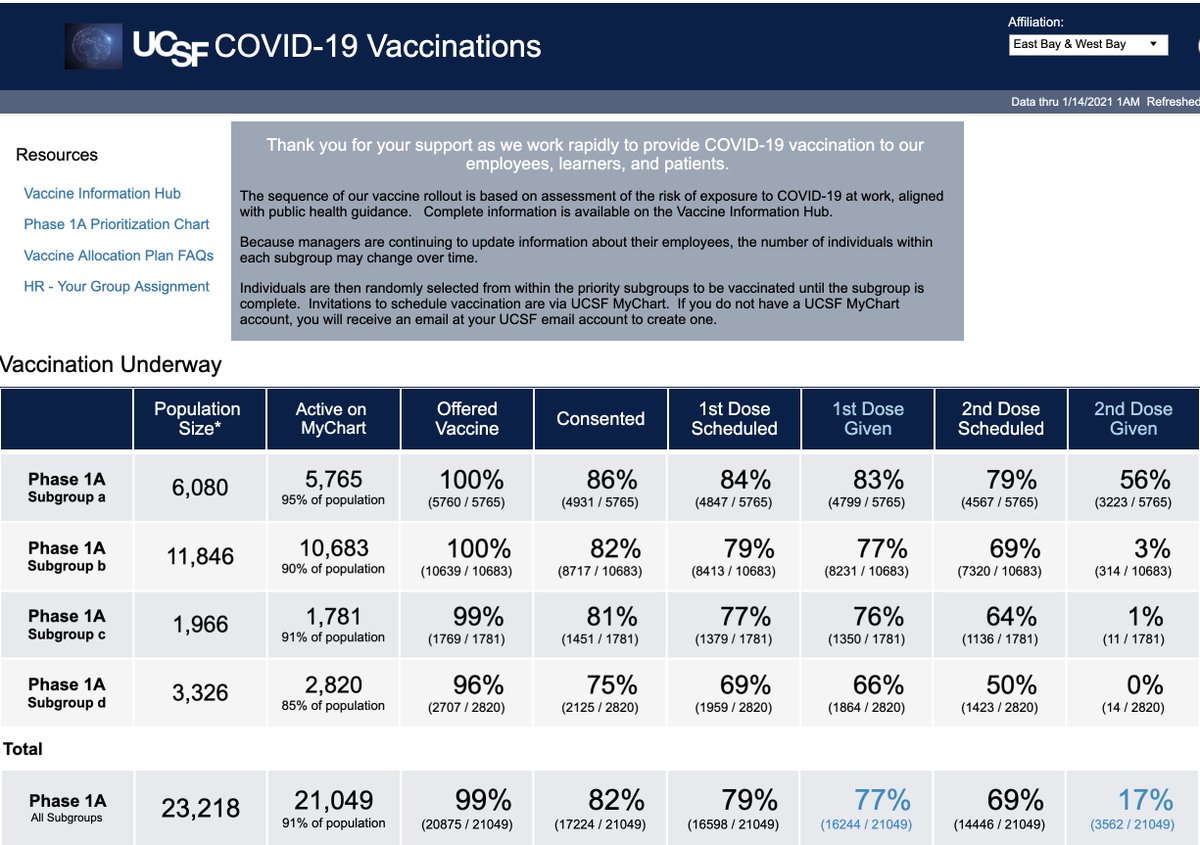
1/ Covid (@UCSF) Chronicles, Day 317
Today was medical grand rounds: brief summary below but worth watching for latest on vaccine distribution in SF, current state of the pandemic, & the variants – overall & with a specific focus on the UK. It’s here: tinyurl.com/yyzggsmv
Today was medical grand rounds: brief summary below but worth watching for latest on vaccine distribution in SF, current state of the pandemic, & the variants – overall & with a specific focus on the UK. It’s here: tinyurl.com/yyzggsmv
2/ We began w/ Susan Philip, acting health officer @SF_DPH, talking about vaccine roll-out in San Francisco. As expected, as distribution has improved the problem is increasingly “supply, supply, supply.” Goal: to vaccinate 10,000 people per day in SF. Three pronged strategy: …
3/ …high-volume vaccination sites, community pharmacies, & smaller community-based sites (mobile hubs, clinics). @UCSFHospitals & other healthcare systems helping (we’re running big site @CityCollegeofSF). Plan is to be provider agnostic (pts can go to any site to get vaccine). 
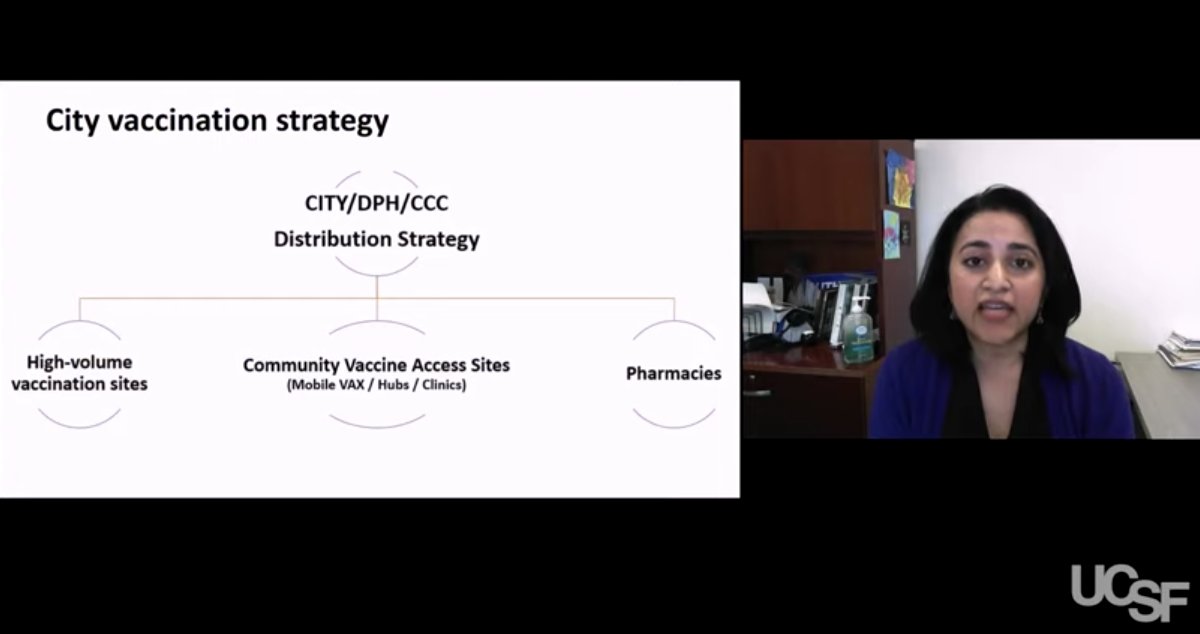
4/ Big focus on equity led to placement of mega-sites @ City College, Moscone, & SF Produce Market – near diverse neighborhoods. SF is still vaccinating HCWs & people >65; will soon need to grapple w/ operationalizing tricky categories: essential workers & preexisting conditions.
5/ Next up: George Rutherford on state of the pandemic. I couldn’t resist showing tee-shirt that I got from a bunch of docs at a primary care practice in SF who are huge George fans. Front and back below: 


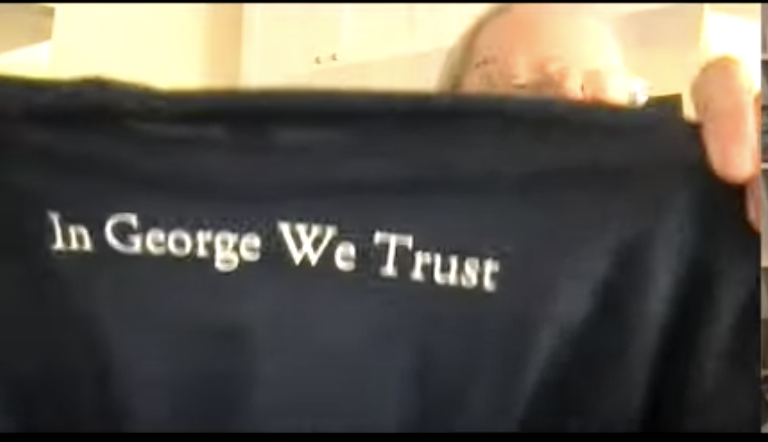
6/ Currently in U.S.: improving but not good (Fig L). Many days, Covid accounts for more deaths than cancer & heart disease combined.
CA death rates (Fig R) falling fast, incl. in SoCal & LA. “Raises the question of whether naturally-acquired immunity is kicking in" in SoCal.

CA death rates (Fig R) falling fast, incl. in SoCal & LA. “Raises the question of whether naturally-acquired immunity is kicking in" in SoCal.
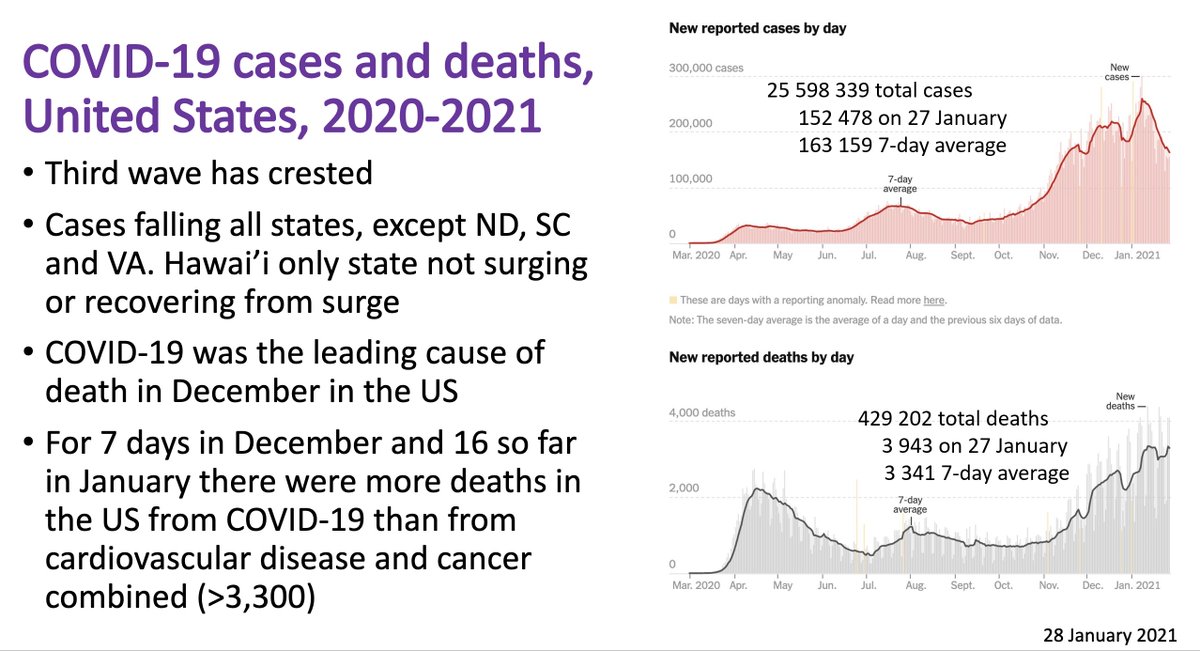
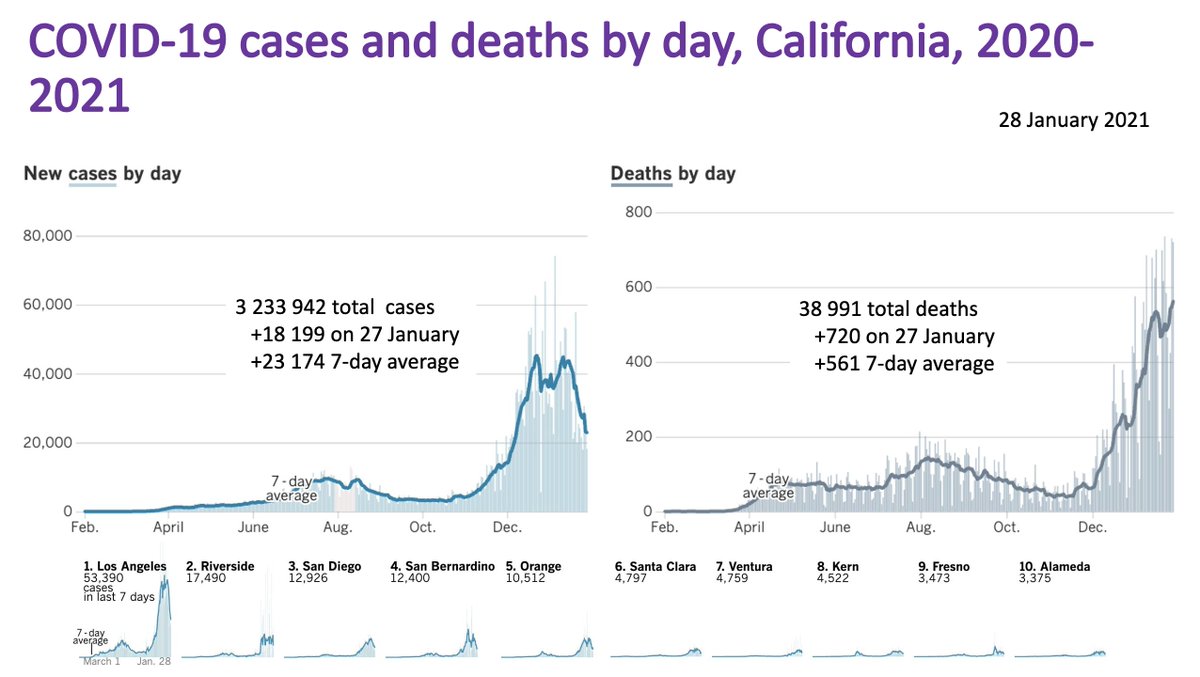
7/ Bay Area also downtrending; every Bay county has falling case rates and Ro’s well below 1.0 – big improvement in past 2 weeks. Improvements in San Francisco and @UCSFHospitals mirror these trends. 
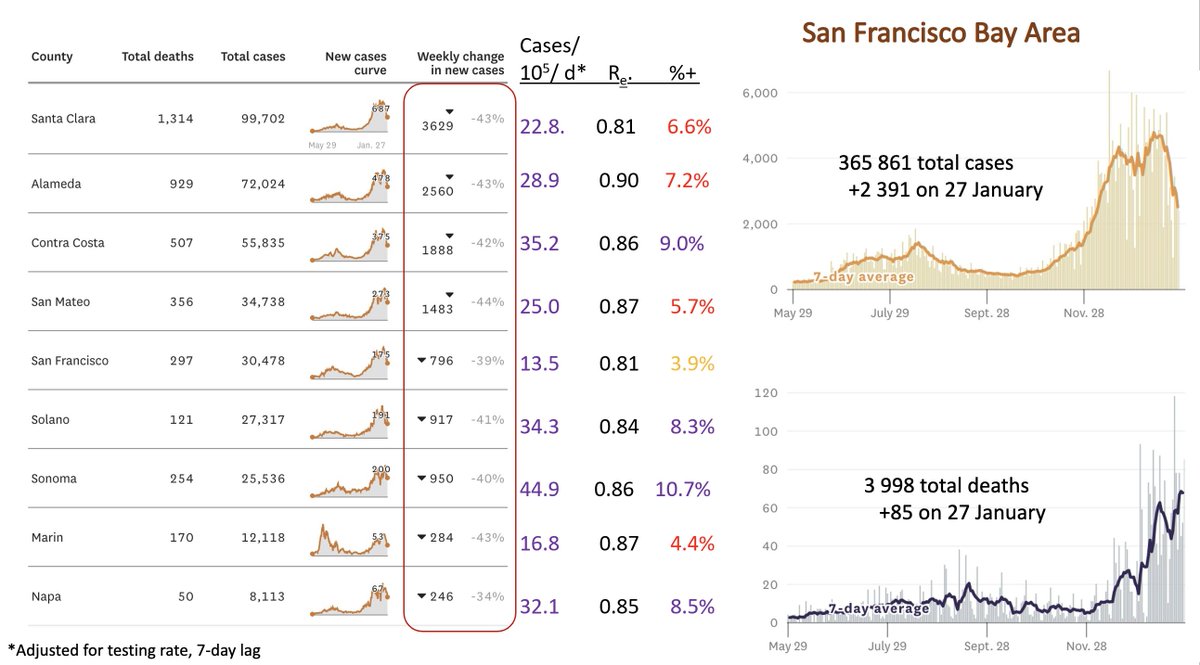
8/ George on vaccines – 4 key questions. 1) Which other vaccines will be authorized in U.S. by summer (maybe 3). 2) How well does single dose work? (Answer; ~90% based on Moderna data); 3) Can vaccines prevent asymptomatic infection (From Moderna trial, it looks like… 
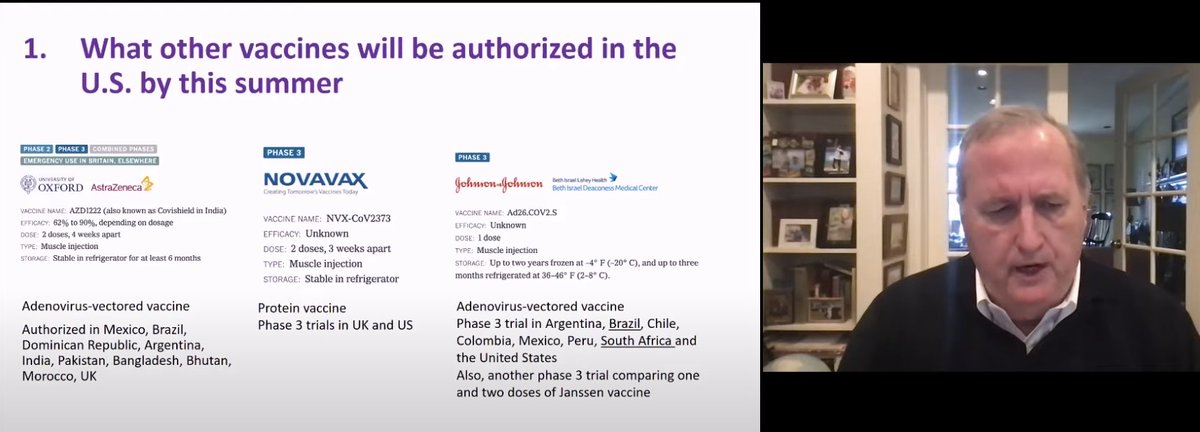
9/ … vaccine was 62% protective vs. asymptomatic infection – so not perfectly protective but pretty good. And 4) How well does vaccine work against variants? (read on).
Was it good call for CA to partly open up? George: Reasonable to “let foot off the brake a little bit.”
Was it good call for CA to partly open up? George: Reasonable to “let foot off the brake a little bit.”
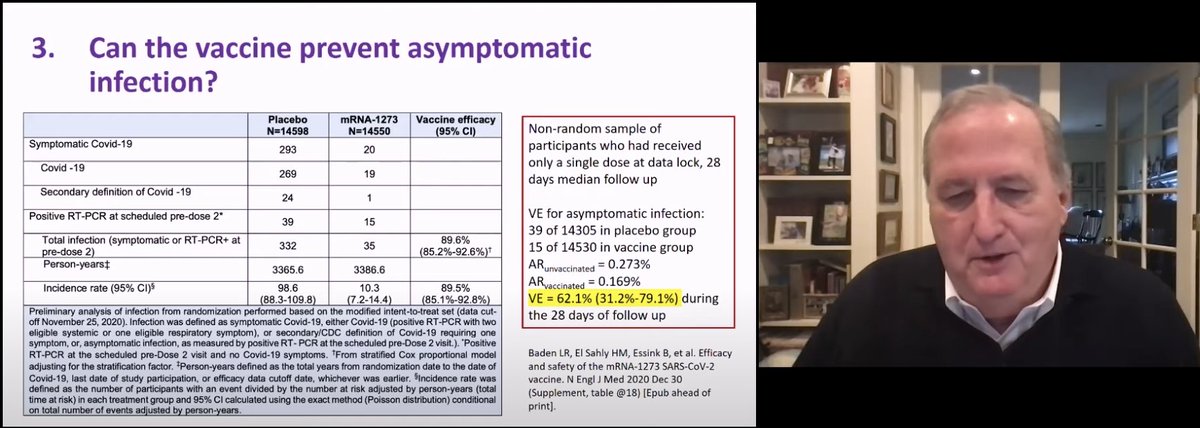
10/ Next: @profshanecrotty, professor @ljiresearch, w/ overview of variants. Executive summary below: UK variant not a concern re: vaccine efficacy; less sure re: South African & Brazilian variants. He thinks its wise to re-tool vaccines in case there's a major drop in efficacy. 
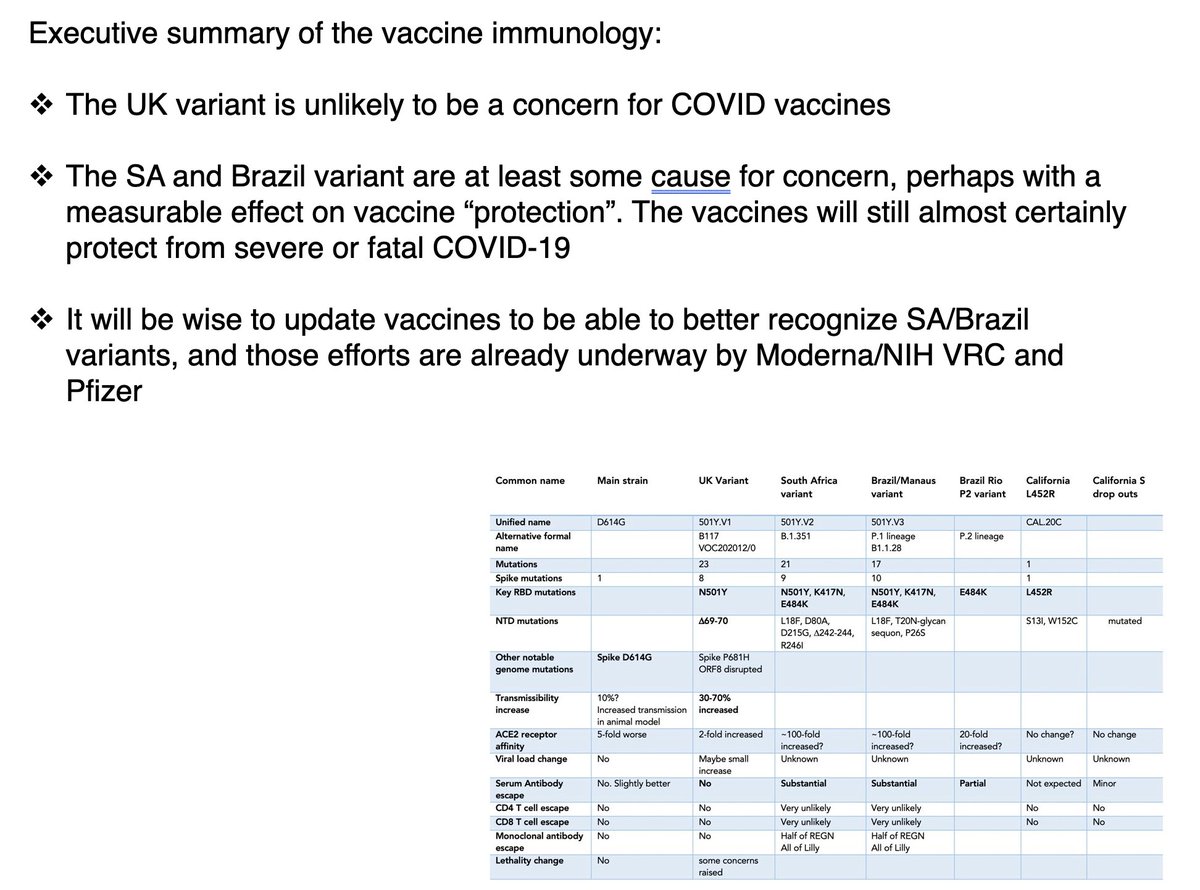
11/ (Note, just after grand rounds @Novavax preliminary data was released tinyurl.com/y4u9y7sl. It showed strong (89%) efficacy (incl. vs. UK variant) but significant drop in efficacy vs. South African variant. Shane told me he was a bit surprised by the extent of that drop.)
12/ Shane discussed multiple mutations in So. African & Brazil variants. Study found “significant immune escape” when tested w/ monoclonal antibodies. But, “what we really care about is the whole population of antibodies in people” & its impact on efficacy; not just monoclonal. 
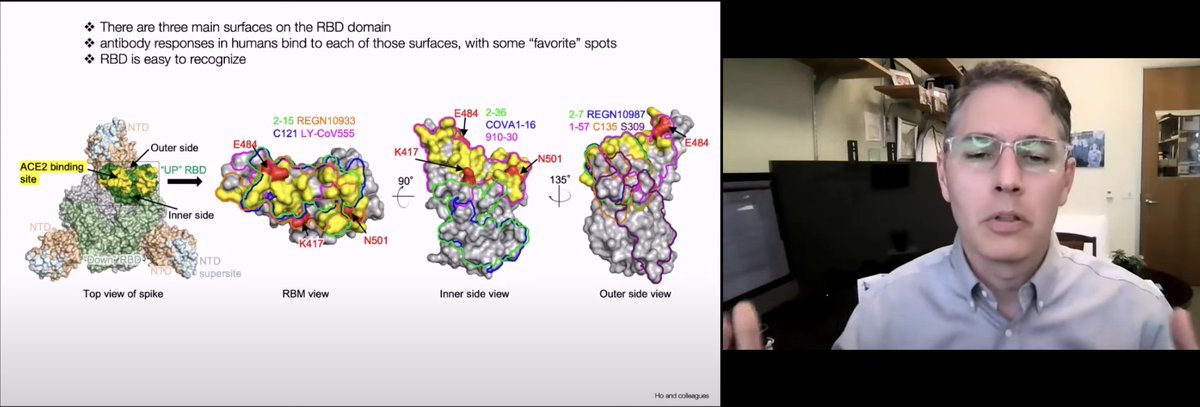
13/ One study on So. African varian: ~half pts had complete loss of immune recognition. But others: modest fall in recognition; likely still enough immunity to work. And “your immune system consists of much more than just antibodies… it has a lot of weapons.” Overall reassuring.
14/ Next (45:00), Sir Patrick Vallance @uksciencechief on UK situation. Nation is now on strict lockdown (“with a light lockdown you won’t get on top of [UK variant]; w/ stricter lockdown you will”), cases are falling (slowly). ~10% of country vaccinated – faster pace than U.S. 

15/ First hint of UK variant: large outbreak in Dec. near London occurred while cases falling elsewhere – gave them sense (later proven) that variant may be more infectious. Still not clear why. Last week, new evidence it may be more severe as well: ~30% increased mortality rate.
16/ No evidence that the UK variant has immune escape – it appears to be susceptible to antibodies from prior infection, to monoclonals, & to vaccines. Thank goodness. They've seen few cases of South African variant in UK, though not yet a major threat.
17/ How did UK people respond to stricter lockdown? “The vast majority of the British public prefers stricter lockdowns [in response to the variant threat] rather than lighter ones.”
The big risk now is that people are beginning to let down their guard after vaccination.
The big risk now is that people are beginning to let down their guard after vaccination.
18/ How should U.S. try to keep the lid on UK or similar variants? George: to contain, we might want to think about focusing vaccinations in areas where UK variant is found ("ring vaccination"). Also, importance of "old fashioned contact tracing" to try to contain variants.
19/ Key lessons for U.S. from UK? Sir Patrick: “When you get outbreaks, you need to move faster than you think you want to, you have to move harder, and you have to go broader geographically than you think you want to.” They tried to keep schools open but had to close them.
20/ UK is delaying 2nd vaccine dose. Shane: delay of booster is fine in terms of ultimate immunity. Big question: Is immunity from 1st dose sustained? Not 100% sure. Also don’t know how much 1st dose alone reduces transmission. Re: concern that you might be inducing mutations…
21/ ...it's real, but Israeli data (big drop in PCR+ after 1st dose) makes Shane less concerned that delayed 2nd dose will promote mutations. Patrick: UK decision to delay 2nd dose was from assessment that it would save more lives than 2nd dose 1 mth later. Must monitor closely.
22/ George on delayed 2nd dose: big concern is messaging – people may think they don’t need 2nd dose – though “I can see it both ways.” If we’re strapped for vaccine, “giving people just 1st dose is fine. But if we have enough, I wouldn’t be messing around with the messaging.”
23/ Where are we today? George: “we have a race (to) get people vaccinated.” Shane: variants are a “bummer.” But "we’ve moved phenomenally fast under challenging circumstances." Thinks likeliest outcome is that vaccines will be OK against the South African & Brazilian variants.
24/ Optimistic or not? Shane: “I think it’s plausible that the virus has done what it can do.” Sir Patrick: “There's an extraordinary light at the end of the tunnel, the whole vaccine story is miraculous… one that brings great hope. In 2021, we’re going to get on top of this.” 
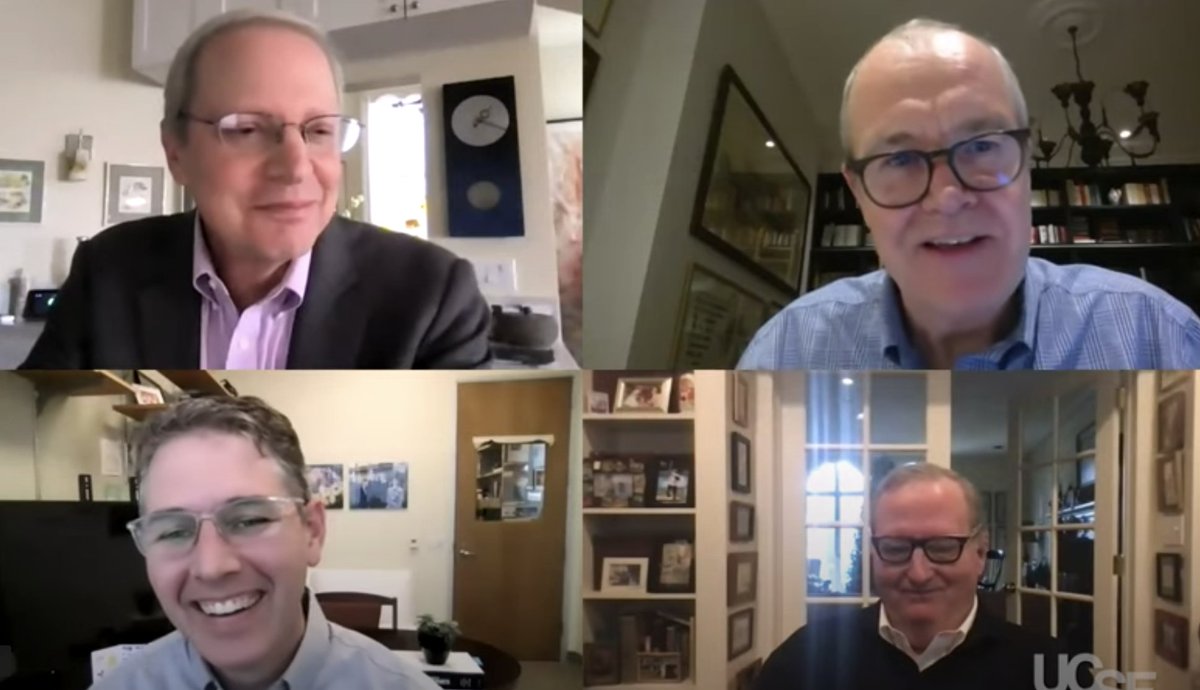
25/ Great session, again it’s here: tinyurl.com/yyzggsmv Regular Grand Rounds next week; next @UCSF Covid Grand Rounds in two weeks. I’ll be back @inthebubblepod Monday speaking to former @CDCgov chief & head of @Merck vaccines (& my former chief resident) Julie Gerberding.
• • •
Missing some Tweet in this thread? You can try to
force a refresh

